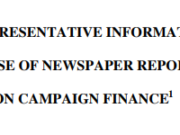Abstract: The theory behind laws prohibiting coordinated communications is intuitive and simple. If a candidate for office, who is subject to statutory limits on the size of contributions he may lawfully accept from individual donors, collaborates on communications strategy and tactics with an outside group that spends and raises its own funds (often from the same pool of donors who give directly to the candidate), then any control the candidate exerts over the outside group’s war chest is tantamount to skirting statutory contribution limits. Therefore, to account for the additional financial resources that a candidate controls in such a scheme, federal law treats coordinated communications like contributions to the candidate, and those contributions are subject to the same statutory limits as monetary contributions. But coordination laws are problematic for four chief reasons.
First, they are ambiguous, vague, and overbroad. Unwary candidates — perhaps first-time insurgents running for office in a populist wave election — should not have to hire lawyers to help them decipher dozens of pages of Federal Election Commission (“FEC”) regulations and hundreds of advisory opinions. Practically speaking, an inexperienced challenger candidate may need a campaign-finance-compliance attorney to help navigate this quagmire, but because the challenger lacks the ability to raise money relative to an incumbent, he likely cannot afford that lawyer unless he is already wealthy. It is difficult to reconcile such a result with the goal of leveling the campaign playing field that campaign finance law purports to achieve.
Second, Congress and the FEC premised federal statutory and regulatory coordination rules on quixotic objectives that, defying explanation, faulty Supreme Court reasoning continues to reinforce. Since most states have enacted coordination statutes that mirror federal law, states have likewise erected their houses of coordination cards on porous foundations. States either follow the federal government’s lead, and treat coordinated expenditures as contributions to a candidate that are subject to statutory limits, or they prohibit coordination between candidates and independent expenditure groups (“IE groups” or “IE committees”) under the pain of varying degrees of civil and criminal penalties. State statutes also fail to meaningfully define exactly what type of conduct constitutes prohibited coordination, which results in substantial overbreadth.
Third, the federal government and the states employ a kaleidoscope of different enforcement regimes. This variance undermines, rather than restores, our faith in the political process, and could chill political participation — especially given how difficult it has become to separate innocent from illegal conduct. States occupy a unique position in the American republican form of government that empowers them to drive broad-based reform in this problematic area of campaign finance law. Just as clearly drafted model rules in other areas of law have increased social and economic stability and predictability, a clearly drafted model conduct standard for what constitutes a prohibited coordinated communication would intuitively cure most of the problems with the prevailing regime.
But fourth, state legislatures should not reach for just any conduct standard. If they did, they would make the same error they made when they haphazardly adopted the language of federal statutes and regulations. Rather, States should kill two birds with one stone by considering fundamental liberal values and civil liberties that coordination laws implicate before adopting a common conduct standard. When considering fundamental values, lawmakers should also embrace, rather than ignore, practical realities of electoral politics that the law need not try to correct.
Several commentators have tackled problems with coordination doctrine, each wrestling with certain features of federal law and proposing solutions to various problems as they see them. This Note is the first contribution to the campaign finance literature to comprehensively survey and critique state coordination statutes, and consequently it is the first to argue for state-level reforms that will drive liberalization of the problematic federal campaign finance law regime. Drafted without clear standards for what conduct gives rise to a violation, this Note argues that federal and state coordination laws — coupled with political actors using the specter of coordination as a rhetorical cudgel against opponents — fuel confusion and undermine confidence in American elections. With the problem thus framed, this Note then argues that states should, at a minimum, amend their coordination statutes with a narrow model conduct standard that would offer clarity and certainty to candidates, IE groups, judges, scholars, media, voters, and laymen alike.













